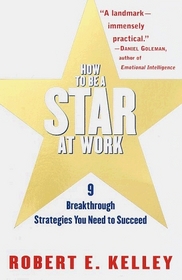This is one of the best business books about how to improve work performance and achieve superior results. It is aimed primarily at individual employees, but would be a great resource for managers also, to tell them what qualities they should be looking for in their employees and also the qualities for which they should be mentoring. The book is told as a story and conversation, making it very accessible to most readers.
The book is based on credible research into the differences between "star" performers and average performers. A good example is the star quality of "taking initiative." Average performers tend to view this as any idea they implement, whether it helps only them or others and whether it contributes to the bottom line or not. In other words, a lot of the average performers "initiative" is perceived by managers as just "doing their job". Or, average performers take initiative in projects that don't directly contribute to the bottom line, like planning the company picnic.
Stars, by contrast, see taking initiative as stepping outside their job description AND contributing something that improves the bottom line. An example might be to figure out a way to resolve a recurring service problem and then training colleagues in the method. In many cases I think of real initiative as working in the "white space", the spaces nobody owns but that need some attention.
The book makes the case that star performers aren't born. They don't necessarily have above-average IQ's nor possess any particular personality traits. The nine strategies identified in the book can be learned and used by anyone.
This book would make a great gift for a recent college grad.
The book is based on credible research into the differences between "star" performers and average performers. A good example is the star quality of "taking initiative." Average performers tend to view this as any idea they implement, whether it helps only them or others and whether it contributes to the bottom line or not. In other words, a lot of the average performers "initiative" is perceived by managers as just "doing their job". Or, average performers take initiative in projects that don't directly contribute to the bottom line, like planning the company picnic.
Stars, by contrast, see taking initiative as stepping outside their job description AND contributing something that improves the bottom line. An example might be to figure out a way to resolve a recurring service problem and then training colleagues in the method. In many cases I think of real initiative as working in the "white space", the spaces nobody owns but that need some attention.
The book makes the case that star performers aren't born. They don't necessarily have above-average IQ's nor possess any particular personality traits. The nine strategies identified in the book can be learned and used by anyone.
This book would make a great gift for a recent college grad.




